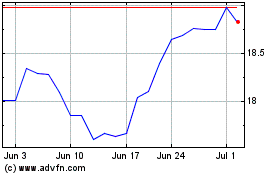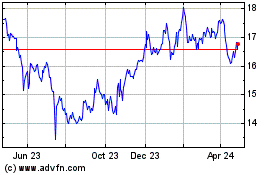By Lauren Weber
Among the hard truths the new coronavirus is revealing is this:
A pandemic can be a good time to work for a big company.
As many small businesses operating with little cushion are
laying off employees, dozens of large companies so far have
extended pay and benefits to workers whose livelihoods are affected
by the virus.
AT&T Inc. is offering up to 80 hours of paid time off to
employees whose children are suddenly at home and need supervision.
JPMorgan Chase & Co. is sending $1,000 bonuses to certain
branch and operations employees who can't work from home, to help
allay costs like child care and transportation. Saks Fifth Avenue
is closing its stores for two weeks and will pay employees for
their scheduled shifts. Many other big companies are extending
similar assistance.
Apple Inc. has closed stores outside of greater China
indefinitely, saying hourly workers will continue to be paid.
Facebook Inc. said it would give full-time employees an additional
$1,000 in their next paycheck and would continue to send its legion
of contractors, including content moderators, home with pay.
There are exceptions. Already, companies hit hard by travel
restrictions and anxieties, like airlines and hotels, have
instituted unpaid leaves and furloughs. On Saturday, Marriott
International Inc. confirmed to The Wall Street Journal that the
company was furloughing about two-thirds of its 4,000 corporate
employees at the company's Bethesda, Md., headquarters and
furloughing about two-thirds of its corporate staff abroad.
The corporate furloughs follow the hotel giant's decision to
begin furloughing hotel staff.
But generally, thus far, large companies' resilience has
contrasted with the cut shifts and layoffs at many small companies,
which often operate with little margin for a crisis. Large
companies typically have more means -- diverse assets, cash,
longtime relationships with investors and banks -- to weather
turmoil. They are also acting with an eye on the court of public
opinion.
Just over half -- 54% -- of employers say they will continue for
some period of time to pay hourly staff whose workplaces shut down
due to the virus, and 51% will pay people who stay home because of
cold and flu symptoms, according to a survey of 805 large companies
polled last week by consulting firm Willis Towers Watson. About one
third say they will pay employees who need to stay home because of
their children's school and day-care closures.
Business leaders today are balancing their wish to be perceived
as good corporate citizens and retain connections with employees
for a time of economic rebound, and grim business projections from
the coronavirus. A misstep in either direction risks goodwill or
survival.
The pandemic in some ways is shaping up to be a natural
experiment in stakeholder capitalism, the vision laid out last
August by the Business Roundtable. The association, composed of
chief executives of some of the nation's largest companies, adopted
a definition of corporate purpose that promotes "an economy that
serves all Americans," jettisoning its prior focus on shareholders
above all others.
The statement of purpose, signed by more than 180 CEOs,
specifically mentions employees as stakeholders.
Joshua Bolten, the president and CEO of the Business Roundtable,
in an interview Sunday said in the long term, stakeholders'
interests are congruent. If employees, customers, suppliers and
communities can't be supported, "there will be no business for
shareholders to own when we come out of this crisis," he said.
But even very large enterprises have limits, he added. "The
decisions some of them are currently making actually have to do
with the survival of the enterprise."
At Waste Management, the big trash and recycling collector,
chief executive Jim Fish told employees the company will continue
to pay them for 40-hour workweeks regardless of whether their hours
are cut or services are curtailed.
"What I did not want is to have any of our 45,000 teammates
worry about how am I going to pay my rent or feed my family," he
said in an interview Friday morning. "We know it will be costly for
the company but that doesn't matter."
Mr. Fish said he made the decision a couple of weeks ago and ran
it by his senior leadership team and board of directors. He said
the policy will continue indefinitely.
"I sure hope this thing doesn't go on for two years. But
honestly if it did, I'd tell you that 40-hour guarantee becomes
increasingly valuable the farther out you go."
Replacing people is expensive, running up to $20,000 when a
Waste Management employee quits. "So purely from an economic
standpoint, I'd still tell you it's the right thing to do," he
said.
A few days ago, he also sent an email to 11 CEOs he knows,
asking them to do something to help small businesses, an important
customer base for large enterprises. He said several had already
responded with enthusiastic agreement. For its part, Waste
Management is already working with small and medium-size customers
to alter payment terms and extend service.
Many companies extending pay or benefits are putting endpoints
in place, raising questions of whether the measures will outlast
the virus's impact. According to the Willis Towers Watson survey,
the typical organization guaranteeing pay through the disruptions
is capping compensation at 14 days, which means another reckoning
point is coming at the end of March.
At first, extending pay and sick leave was the right business
strategy, "particularly because it bought you a bunch of goodwill,"
said Nicholas Bloom, an economist at Stanford University's Graduate
School of Business. "As we go further into March, CEOs are facing a
grimmer reality."
Even big companies, he said, may face limits as to what they can
or are willing to provide.
"I don't think anyone wants to be the first to slash employees,"
Mr. Bloom said. "But if five to 10 high-profile companies lay off
workers, it may be like a dam bursting. If bad news continues to
pour out, there will be a rush to the exit as everyone dumps
workers."
Write to Lauren Weber at lauren.weber@wsj.com
(END) Dow Jones Newswires
March 22, 2020 12:33 ET (16:33 GMT)
Copyright (c) 2020 Dow Jones & Company, Inc.
AT&T (NYSE:T)
Historical Stock Chart
From Mar 2024 to Apr 2024

AT&T (NYSE:T)
Historical Stock Chart
From Apr 2023 to Apr 2024
